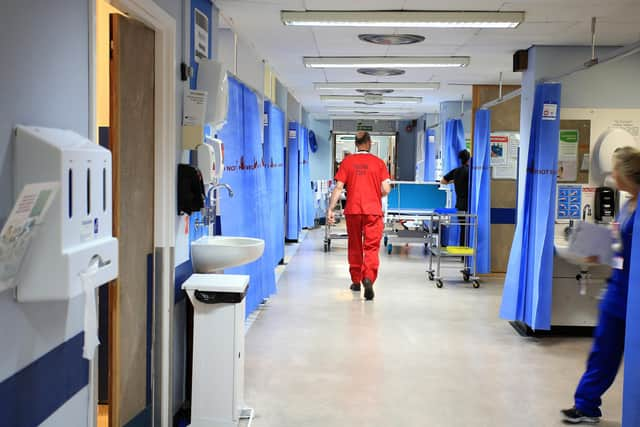Covid Scotland: NHS may need to cut all non-urgent care this winter, say unions
The health service is in “absolute crisis”, warned Unison, while the Royal College of Nursing said nurses were “crying on a daily basis” and frightened of the winter to come.
It comes as the first soldiers are set to begin driving ambulances this weekend, after a request for help from the Scottish Government.
Advertisement
Hide AdAdvertisement
Hide AdSeveral health boards have already cancelled non-urgent surgeries, and in a statement on Friday NHS Grampian said it would be forced to prioritise the most sick children at the Royal Aberdeen Children’s Hospital over the weekend.


“This is the worst it’s ever been in the NHS,” said Willie Duffy, head of health at Unison.
"People are really struggling. They’re working extra shifts, they’re not getting any holidays, they’re having to stay on shift longer. There are real issues just now.”
Mr Duffy said he would write to the Scottish Government next week about the union’s concerns.
“It might be that we’re going to have to stop a lot of the [routine and elective] work that we do,” he said.
"I know that increases waiting times, but we’re struggling just now in terms of emergency stuff.
“They are going to have to really consider that as an option.”
He added: “That will create a lot of problems because there are people who have been on waiting lists for much longer because of the pandemic, but the service is in absolute crisis.”
Advertisement
Hide AdAdvertisement
Hide AdThe Royal College of Nursing called on the Scottish Government to be more honest about non-urgent waiting times.
“I appreciate that people who are waiting for non-urgent treatment are desperate for the NHS to get back to some kind of normality,” said Norman Provan, Associate Director.
“But quite frankly when you're in the middle of a pandemic, and the pressure is so unrelenting on the service, the Scottish Government should be more honest with the public about what can be achieved.
“You just simply shouldn't be aiming to do ordinary non-urgent work when the system is under that much pressure.
"But it's publicly difficult to say that, it’s not a publicly well-accepted message that people who are waiting for certain non-urgent health care.
"The Scottish Government are keen to say they are trying to re-mobilise and will get everything back to normal as quickly as they possibly can… it's just not possible.”
Mr Provan said services should return to normal as soon as possible, but that he “can’t see that in the near future”.
Many people with long-term conditions may have deteriorated in the last 18 months and now require urgent care, he said.
Advertisement
Hide AdAdvertisement
Hide Ad“There are obviously reasons why you would want to re-mobilise some of the service, but the Scottish Government need to concentrate all their efforts on stabilising the services that need to be delivered right now because of urgent patient demand,” he said.
“Other stuff will have to wait.”
The Royal College of GPs (RCGPs) said general practice is seeing the increasing effect of deterioration in those waiting for non-urgent surgeries.
Joint chair Dr David Shackles said he sees at least one patient at every surgery whose sole reason for calling is to check where they are on a waiting list, with some being told they still have another year to wait.
“If you're less mobile, and your mobility decreases because you're not as active and we lack the access to face to face physiotherapy and other community-based resources… the risk is that people become more deconditioned by the time they do get to their surgery,” he said.
There is a psychological aspect as well, Dr Shackles said, adding that people waiting for surgery may have chronic pain, which is a risk factor for depression.
Current pressure on the system is down to high demand, Mr Provan said, but also to staffing issues which were present before Covid, including low rates of pay for nurses and widespread vacancies.
Nurses are struggling to cope under the strain, he said.
Hilary Nelson, an RCN steward based in Forth Valley, said she is seeing fear and distress in nurses across the system.
“We hear reports of nurses crying on a daily basis, we hear nurses saying they’re done, that they’ve had enough,” she said.
Advertisement
Hide AdAdvertisement
Hide Ad“Nurses are frightened. It’s not winter, it’s only September. Normally there's a bit of a lull in the summertime and you can have time to rest and recuperate… there’s no let-up, and people are frightened ahead of the winter, because we know that it’s going to be hard."
Mr Provan said he hears from nurses who feel they are unable to provide the right level of care for patients, because they are under so much pressure.
He cited examples of nurses arriving on shift to find they are working alone when they should be in a team of five, or staying several hours after shifts because there is “physically nobody to give the keys to the ward to”.
“I don't want to frighten the general public but the fact of the matter is that when you don't have enough people to do the job then invariably shortcuts are found and things aren't done as well as they should be,” he said.
The Scottish Government was contacted for comment.
A message from the Editor:
Thank you for reading this article. We're more reliant on your support than ever as the shift in consumer habits brought about by coronavirus impacts our advertisers.
If you haven't already, please consider supporting our trusted, fact-checked journalism by taking out a digital subscription.
Comments
Want to join the conversation? Please or to comment on this article.
